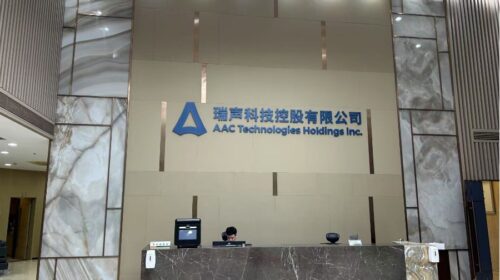Goldlion joins stock retreat as brand loses its luster

The menswear maker has become the latest firm to announce plans to delist from the Hong Kong market as it grapples with weak Chinese consumption
Key Takeaways:
- The privatization is pitched at a premium of 24.85% over the stock’s pre-suspension price, but is about 65% below the net asset value per share
- At mid-year the apparel company held about HK$1.07 billion in cash and about HK$3.4 billion in property investments
By Lee Shih Ta
A new trend is taking hold in Hong Kong’s winter sales season, and a clothing company renowned for its classic menswear has hopped onto the bandwagon.
Earlier this month Goldlion Holdings Ltd. (0533.HK) announced plans to delist from the Hong Kong Stock Exchange after three decades as a public company, joining a host of small-cap firms that want to revert to private ownership after struggling to find favor with investors.
In December alone, store operator Lifestyle China (2136.HK) and resort owner Fosun Tourism (1992.HK) have all announced privatization deals.
In Goldlion’s case, a company run by its chairman and major shareholder, Tsang Chi Ming, is offering to pay HK$1.52 ($0.13) per share, a premium of 24.85% over the stock price before trading was suspended. It would cost around HK$464 million to buy out the 304 million shares held by minority investors, representing 31.25% of the total share capital.
Goldlion started out in 1968 as a Hong Kong family business making silk neckties. It went on to become a familiar choice for formal menswear in mainland China, specializing in smart suits and accessories. However, competition from newer brands and sluggish retail sales in China since the pandemic have weighed on sales, eroding investor interest in the stock.
The firm’s share price had been flat or falling all year, failing to reap any major benefits from a Hong Kong rally ignited in September by Chinese economic stimulus policies. In explaining its decision to exit the stock market, Goldlion noted that the benchmark Hang Seng Index had fallen 26.72% in the past five years and the company’s share price had barely budged in the latest market rally, hamstrung by low trading volume. The privatization offered shareholders the opportunity to cash in their holdings at an attractive premium in a market clouded by uncertainties, the Goldlion statement said.
Goldlion also said it had not raised fresh equity capital in the past 20 years, rendering its listing status less relevant as a financing instrument. As a private company it hoped to streamline its costs and enjoy more business flexibility.
The market appears to have got wind of the delisting plans before the official announcement. Goldlion’s stock surged 37.1% on November 21 before trading was suspended and leapt another 13.9% to HK$1.39 on December 18 when trading resumed.
Not so attractive after all
The privatization offer, at HK$1.52 per share, marks a 24.85% premium over the pre-suspension market price, but by another key measure the deal represents a deep discount. The net asset value per share stood at HK$4.47 at the end of June. Using that as a base, the buyout would transact at a discount of about 65.95%, with Goldlion ruling out any room for a price increase.
Goldlion holds cash and deposits totaling HK$1.07 billion and has no long-term or short-term debt, according to data contained in its half-year results. Its investment properties and real estate assets under development command a total book value of more than HK$3.4 billion. Taking those assets into account, going private at HK$464 million looks to be a bargain for Goldlion.
Hong Kong Stock Exchange rules require a privatization to gain the consent of 75% of shareholders, with less than 10% of disinterested shareholders opposed. That means Fidelity Investments could effectively veto the deal through its holding of around 58.7 million shares, which amount to 5.99% of the total equity and 19% of the disinterested shares.
The proposition could be a hard sell for small shareholders, given that Goldlion’s stock price has been in the doldrums for a long time and even fell below HK$1 in the second half of this year. But it does present an opportunity to offload Goldlion shares as the clothing company loses traction in the mainland apparel industry, leaving scant hope for a stock price recovery.
Founded by Hong Kong’s “Tie King” Tsang Hin Chi, the company entered China’s mainland market in 1984, selling formal menswear, business casual clothing and leather shoes. As its retail outlets spread, Goldlion became a household name in China with its “Men’s World” advertising slogan.
Goldlion also branched out into commercial and private real estate, with rental projects in Hong Kong, Guangzhou and Shenyang, as well as two residential projects in Meizhou, Guangdong Province. The value of its property assets is approximately HK$2.64 billion.
Seeing trouble ahead
Unfortunately for Goldlion, consumption and real estate are China’s two weakest sectors right now, as the economy struggles to pick up momentum. Property market woes and purse-tightening have both taken a toll on Goldlion’s earnings, which have been slipping since 2022.
Goldlion revenue’s fell 9% to HK$600 million in the first half of 2024 from the year-earlier period, while income from clothing and apparel in the mainland market also dropped 9%. Profit for the six months fell 26% to 58.23 million yuan, after a 24.8% drop for the full year in 2023.
As well as announcing a fall in half-year profits, Goldlion could offer little comfort for investors about its future business prospects. “The operating outlook for the second half of 2024 will remain very difficult as it is expected that the domestic macroeconomic environment has not yet stabilized, and consumer confidence and market momentum will remain weak and difficult to improve in the short term,” the company said.
Facing challenges in its core businesses, Goldlion has diversified into new energy. It set up a photovoltaic company in 2023 and invested about HK$9.07 million in the project in the first half of 2024. However, only HK$380,000 of revenue flowed from electricity sales in the half year, generating a slight profit.
The company has bluntly stated that any adverse event could leave investors struggling to sell off large blocks of shares because of low liquidity. Goldlion appears to be encouraging smaller shareholders to cash out, even at an unappealing price, rather than run the risk of getting bogged down later.
As for Goldlion, a delisting could provide an opportunity to take stock of its business strategy and shift its focus towards longer-term development.
To subscribe to Bamboo Works free weekly newsletter, click here






